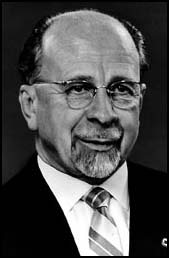Walter Ulbricht
1893 - 1973

Walter Ulbricht was born Ernst Paul, in Leipzig in June 1893. Ulbricht was a member of the Socialist Labour youth and in 1912 of the Sozialistische Partei Deutschland (SPD). After the first world war Ulbricht joined the Spartakusbund, which won the name “Communist Party of Germany” in 1919. In the mid-1920s Walter Ulbricht studied at the party school in Moscow. From 1926 to 1933 he was a member of the Saxon Landtag and from 1928 to 1930 a member of the Reichstag for the KPD. In 1935 he fled from Germany and settled later in Moscow. After the German invasion of the Soviet Union Walter Ulbricht was member of the National Committee for a free Germany (NKFD), called into life by the Soviet Union. After the second world war, Walter Ulbricht returned to Germany and settled in the Soviet occupied zone. The Sozialistische Einheitspartei Deutschland (SED) was created in 1946, and in 1950, Ulbricht was elected SED General Secretary.
During the Berlin revolt in 1953 Ulbricht and the SED were in confusion; they had to use force against the farmers and workers in a peasants and workers utopia? Eventually the Russians beat the rebellion at the expense of presumably many hundreds of lives. The power of the SED and Ulbricht from that moment were untouchable. Ulbricht kept faithfully to the Moscow faithful line into the 1970s. At the beginning of the 1970s Ulbricht took a more independent course. As a result, in May 1971 he had to resign his position as General Secretary of the SED. He remained Chairman of the Council of State. Became popular, but was never charismatic. Walter Ulbricht died in August 1973 at the age of 80 in Berlin. He was succeeded by Erich Honecker.
Works
“Article in Die Welt”, 1940